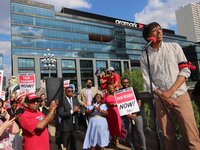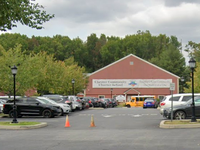An alarming pattern of early revenue shortfalls from Philadelphia's sugar-sweetened beverage tax could be "creating a multi-million dollar burden," outgoing city controller Alan Butkovitz wrote Tuesday in a letter to finance director Rob Dubow.
Focus on the 1.5-cents-per-ounce tax, applied in Philadelphia at the start of 2017, has picked up in recent weeks after the city's April revenue sunk to $6.5 million, a 7 percent drop-off from a high of $7 million in March. To date, Philadelphia has collected $25.6 million in soda tax revenue, $5.2 million below its initial projection.
- RELATED ARTICLES
- Philadelphia's soda tax remains legal after Commonwealth Court ruling
- Sante Fe voters reject soda tax, hand rare win to industry
- Philly officials encouraged by study on effects of Berkeley's soda tax
- Drexel study examines how money-framing strategy, not health benefits, led to Philly's soda tax passage
Hitting the city's original projection of $46 million by June 30 would require the collection of more than $20 million in May and June, an improbable scenario that Butkovitz warns is reminiscent of the School District of Philadelphia's cigarette tax.
"The City appears to be creating a short-term and long-term deficit through the Beverage Tax by not budgeting with true and accurate collection figures," Butkovitz wrote to Dubow. "The School District of Philadelphia encountered a similar problem when it implemented the cigarette tax. Initially, the school district budgeted $80 million in the first year. Unfortunately, it never reached that figure and has been on a steady decline since, generating less than $50 million in the current year."
Part of the problem, Butkovitz said, is that the city lowered its initial projections for the first two months of the year. That revision made the $5.7 million collected in January, for example, appear to be double the projected $2.3 million for that month.
“Lowering the projections for the first two months and not reflecting those revised figures in the annual projection ultimately created a deficit that the city now has to realize,” Butkovitz said. “These shortfalls are potentially creating a multi-million dollar burden on the city in order to pay for programs and initiatives like Pre-K and Rebuild."
While the tax has yet to hit its monthly projection of $7.7 million, the Kenney administration has said revenue collection is subject to seasonal changes, variations in due dates and fluctuations typical of any new tax.
Touted as a way to fund universal pre-K, community schools and the revitalization of Philadelphia's parks and recreation centers, the soda tax drew immediate protests and criticism from the beverage industry and distributors who claim the levy harms workers and lower-income residents in Philadelphia.
“Today’s news show once again that this tax is not a sustainable source of revenue for the city," said Dave McCorkle, president and CEO of the Pennsylvania Food Merchants Association, in a statement released Tuesday afternoon. "Reality is finally catching up with the mayor’s inflated projections. The city has yet to achieve its full collections target and is once again moving the goalposts. This latest move by the administration highlights the undeniable flaws in a failed tax that is costing jobs, raising prices for working families and hurting local business."
Lobbyists who oppose the tax continue to challenge its constitutionality in court, where a Philadelphia judge upheld the measure in December. A panel of Commonwealth Court judges heard arguments about its legality in April but have yet to announce their ruling on the appeal.
Philadelphia has averaged about $6.4 million a month in revenue since the tax was implemented, Butkovitz noted. Over the course of a year, that would generate $76.8 million, well short of the $91 million annual figure the city projected and has thus far maintained as the goal.
To ensure transparency, Butkovitz has requested that the city provide his office with the latest revenue projections—both the current fiscal year and the five-year budget plan—to demonstrate the tax's ability to meet future funding goals for the programs associated with its passage.






